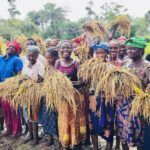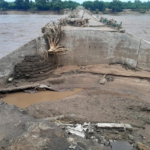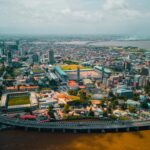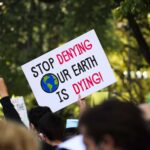In the forested hills of western Ghana, a quiet resistance is taking shape.
At sunrise in Jema, a town of about 15,000 people, residents gather with sticks in hand — not for ceremony, but for patrol. Their mission: stop illegal gold mining before it destroys what remains of their land and water.
For a year now, the community-run Jema Anti-Galamsey Advocacy has combed through forests and riverbanks, tracking signs of illegal mining, known locally as galamsey. They are priests, farmers, traders — ordinary residents pushed into extraordinary action.
And as gold smuggling drains billions from Ghana’s economy and contaminated rivers cripple public health, their message is blunt: “If we stop fighting, we will lose everything.”
A Crisis Fuelled by Poverty and Pollution
Ghana is Africa’s largest gold producer, yet it is battling a surge in illegal mining that is poisoning rivers with mercury and cyanide.
Environmental groups and authorities warn that nearly 44 forest reserves have active galamsey operations, with nine effectively overtaken by armed groups.
Ghana’s economic downturn has fed the crisis. Inflation soared above 50%, youth unemployment sits at nearly 39%, and thousands of young people are turning to illegal mining in search of fast cash. The country has lost an estimated $11.4 billion in gold smuggling over five years.
“Our water bodies are clean because of our resistance,” says Father Joseph Blay, a local priest helping lead the community patrols.
“If we give up, nothing will survive.”
Community Patrols Step In Where the State Falls Short
Jema banned all mining on its lands in 2015, using powers granted to local chiefs to enforce customary law.
But as illegal miners pushed toward the area, the community formed its own task force to fill the gap left by weak enforcement.
Armed only with sticks, they patrol the forests weekly, relying on satellite imagery, water colour changes, and tip-offs from villagers. When they find suspected miners, they make citizen arrests and hand them over to the police.
But this grassroots approach carries risks. Volunteers receive death threats. The Ehole River — once clear — has begun turning a murky brown, a warning that illegal mining may be creeping upstream.
Some villagers, driven by poverty, quietly oppose the patrols. One young man told reporters he’d rather sell his land to miners than keep farming — fertiliser costs have tripled since 2022.
A National Problem With No Easy Fix
Ghana has seen mass protests calling for a tougher crackdown. President John Mahama has launched a national task force, but stopped short of declaring a state of emergency.
Critics say the government lacks political will, while security experts warn that unregulated community patrols could create human rights abuses or ethnic tensions if not properly overseen.
Still, conservationists say Jema’s model offers lessons.
“If the government is serious, the Jema template can be replicated,” says Father Blay.
“We need alternatives — jobs, tourism, and real investment.”
The community hopes the Jema Forest Reserve can be transformed into a tourism hub, providing sustainable income that doesn’t depend on destroying the land.
As Galamsey Spreads, The Fight Is Becoming a Test of National Will
Ghana’s battle against illegal mining is more than an environmental crisis — it’s a fight for livelihoods, public health, and economic sovereignty.
And in Jema, the frontline is not a military base or government office. It is a community that refuses to stand by while its rivers turn toxic and its youth risk their lives for scraps of gold.
Their plea to Ghana’s leaders is simple:
Back the communities who are already doing the fighting.










